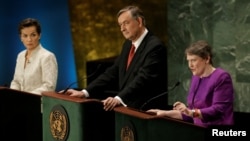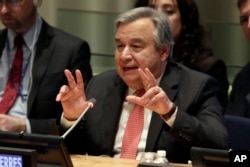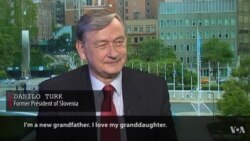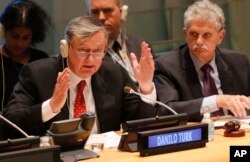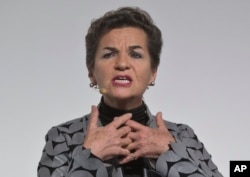There are two daughters of former presidents and one of a farmer; a history buff, a former president, an honorary citizen of Timbuktu and an assortment of foreign ministers, all of them want to be the next chief of the United Nations.
In all, a dozen declared candidates are in the race to become the ninth secretary-general, and for the first time, half of them are women.
Eastern Europe is hoping one of its eight candidates will prevail, as its region has never had a U.N. chief. There is also a push by more than 50 member states to see a woman selected.
On Thursday, the search for the person to fill what the first U.N chief, Norway’s Trygve Lie, described as “the most impossible job in the world” will move to the next level. After weeks of unprecedented public interviews and even a “debate” of sorts, the decision-making will start.
The 15-member U.N. Security Council will begin secret, closed-door “straw polls”, an unofficial vote to gauge enthusiasm for each candidate.
Council members will check off “encourage,” “discourage” or “no opinion” for each nominee. If a candidate performs poorly, they might consider withdrawing their candidacy.
The five permanent members - Britain, China, France, Russia and the United States - get to use their veto in the final rounds of the straw polls, meaning they can knock out candidates they don’t like. So while they can’t “make” a candidate, their veto can “break” one.
By October, diplomats say, they hope there will be a council decision about Ban Ki-moon’s successor.
Once council members decide, they will send their recommended candidate’s name to the General Assembly, which formally appoints the new secretary-general.
And the winner is …
In the past, candidates’ names were not made public. Some nominees did not even know they were under consideration, as was the case in 1953 with Sweden’s Dag Hammarskjöld. He said he did not know he was in the race until he received a late-night telegram notifying him that the council had selected him and hoped he would accept. He did.
The current president of the U.N. General Assembly decided to shake things up and invite governments to formally nominate their candidates, only one per government.
As a result, for the first time, the contenders have gone through a public interview process, exposing them for better or worse and creating favorites among the general membership, with a consensus that the United Nations needs a strong, competent leader for challenging times. Whether the Security Council and its five veto-wielding members share that view and those preferences is not yet known.
The ‘most impossible job in the world’
With an unending supply of armed conflicts, natural disasters, terror and a global refugee crisis, why would anyone want to be the U.N. chief?
“It’s one of the most wonderful jobs in the world,” Danilo Turk, 64, a former Slovenian president and candidate said in an interview. He compared the U.N. to a big mirror. “It reflects all the problems of the world.It reflects all the hopes of the world.” What could be better, he asks, than serving those hopes?
Former Portuguese Prime Minister Antonio Guterres, 67, says he is running because he wants “to create the conditions for solutions” to global challenges. As the U.N. high commissioner for refugees for a decade until December 2015, he had a front row seat to the consequences of conflict.
“We see things that are going to happen and we fail to organize ourselves, the international community, to be able to act and prevent those conflicts that are then soon going to appear.” Guterres said prevention should be a “global attitude.”
UNESCO Director General Irina Bokova, 64, of Bulgaria supports the idea of an eastern European woman leader. She said her region has “been through profound transformation” and its “experience is extremely important and valuable in this particular moment.”
The U.N. top job is the “ultimate way to make a contribution to the global public good,” New Zealand’s Helen Clark, 66, said in an interview.
The daughter of a farmer who rose to be her country’s prime minister and is currently head of the U.N. Development Program, added, “You can throw your efforts, your energy, your determination and skills into trying to advance peace and security, which is so badly needed in so many parts of the world today.”
“With the right leadership, [the U.N.] has the capacity to bring people together in a unique fashion to put solutions on the table,” Costa Rican candidate Christiana Figueres, 59, said this month.The daughter of a three-time president of Costa Rica, she was the U.N. climate change chief for six years and helped achieve the first legally binding international deal to limit global warning.
What’s next?
In the previous race for secretary-general in 2006, it was not until the fourth round of straw polls, two months in to the voting that candidates without broad support started withdrawing. But with the race much more public this time nominees might drop their bids sooner if they have weak support, rather than endure the potential embarrassment of repeated poor showings.
Straw poll results are supposed to be confidential, known only to the 15 council ambassadors and the envoys of the candidate countries, so they can inform their nominee, but the results are likely to leak out.
Other candidates are also possibly waiting in the wings, watching how the others do and considering jumping into the race. Among them, former Australian Prime Minister Kevin Rudd, who said this week he has asked the new government in Canberra to nominate him, and Kristalina Georgieva, a European Commission vice president.She is from Bulgaria, which already has an entrant in the race, so she will have to secure the backing of another government if she hopes to be considered.
The successful candidate will take over January 1, 2017, for an initial five-year term.Most secretaries-general have served two terms.
(To learn more about the selection process and the 12 declared candidates for U.N. Secretary-General, visit http://www.un.org/pga/70/sg/.)




